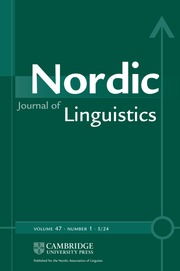The second issue of Volume 42 (autumn 2019) of the Nordic Journal of Linguistics will be a special issue devoted to diachronic syntax within the framework of generative grammar. The issue will be edited by David Håkansson, Erik Magnusson Petzell and Elisabet Engdahl.
With the introduction of the Principles and Parameters theory of Universal Grammar, diachronic syntax emerged as an important domain of inquiry for generative linguists. The study of syntactic change added a temporal dimension to the overall enterprise to better understand the nature of variation in human language. The syntax of the North Germanic languages varying in space and time proved to be a particularly promising empirical field: the linguistic diversity is conveniently limited geographically and it can be tracked back in time, in texts from all over the Nordic countries. The pioneering investigators of syntactic variation and change in North Germanic took an interest in a variety of phenomena. The more prominent topics include the internal order between verbs and objects, null subjects, and subordinate clause word order. However, the theoretical framework of the time was not designed to handle all the subtleties of language variation. By contrast, today, micro-variation has become a core approach within syntactic research, which can shed a new light on previously researched phenomena as well as uncover other phenomena. Consequently, it should be fruitful to revisit many of the issues raised in the past, adding this new perspective of contemporary linguistic theory.
We invite papers on any topic related to North Germanic diachronic syntax, written within a generative model of linguistic theory in a broad sense. The empirical scope of the contributions need not be restricted to this language group; papers addressing other language varieties are welcome, as long as the results are relevant for our understanding of the syntactic development of North Germanic. We particularly welcome papers that aim at studying previously investigated phenomena in light of recent theoretical developments.
The deadline for submitted papers is 1 November 2018. The reviewing process will take place in winter 2018 – spring 2019. The final versions of the accepted manuscripts are due to be submitted to the publisher by 20 June 2019.
Submissions for papers should follow the style guide of NJL available at http://journals.cambridge.org/NJL and be anonymous. Please send a pdf version of the paper to [email protected].


